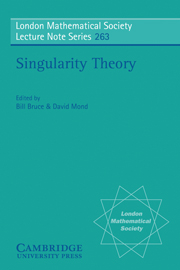 Singularity Theory
Singularity Theory Book contents
- Frontmatter
- Contents
- Preface
- Introduction
- Summaries of the Papers
- Complex Singularities
- Singularities Arising from Lattice Polytopes
- Critical Points of Affine Multiforms on the Complements of Arrangements
- Strange Duality, Mirror Symmetry, and the Leech Lattice
- Geometry of Equisingular Families of Curves
- Arrangements, KZ Systems and Lie Algebra Homology
- The Signature of f(x, y) + zN
- Spectra of K–Unimodal Isolated Singularities of Complete Intersections
- Dynkin Graphs, Gabriélov Graphs and Triangle Singularities
- Stratifications and Equisingularity Theory
- Global Singularity Theory
- Singularities of Mappings
- Applications of Singularity Theory
- References
Arrangements, KZ Systems and Lie Algebra Homology
Published online by Cambridge University Press: 05 May 2013
- Frontmatter
- Contents
- Preface
- Introduction
- Summaries of the Papers
- Complex Singularities
- Singularities Arising from Lattice Polytopes
- Critical Points of Affine Multiforms on the Complements of Arrangements
- Strange Duality, Mirror Symmetry, and the Leech Lattice
- Geometry of Equisingular Families of Curves
- Arrangements, KZ Systems and Lie Algebra Homology
- The Signature of f(x, y) + zN
- Spectra of K–Unimodal Isolated Singularities of Complete Intersections
- Dynkin Graphs, Gabriélov Graphs and Triangle Singularities
- Stratifications and Equisingularity Theory
- Global Singularity Theory
- Singularities of Mappings
- Applications of Singularity Theory
- References
Summary
To Terry Wall, for his 60th birthday.
Introduction
The Knizhnik–Zamolodchikov equations were originally defined in terms of a local system associated to tuples of finite dimensional irreducible representations of SU2, but were soon afterwards generalized to a Kac–Moody setting. The natural question that arises is whether these local systems admit a topological interpretation. A paper by Varchenko–Schechtman [8] comes close to answering this affirmatively and it is this article and related work that we intend to survey here.
Our presentation deviates at certain points from the original sources. First, we felt it worthwhile to introduce the notion of a Knizhnik–Zamolodchikov system (in (1.4)), whose value is enhanced by the simple criterion (1.5). Such systems also occur in the theory of root systems (both in a linear and in an exponential setting) and we took the occasion to discuss them briefly from our point of view. A KZ system leads to what is perhaps the most natural class of local systems on hyperplane complements endowed with a given extension over the whole space as vector bundle. That may already be sufficient reason for this notion to merit a more thorough investigation than we can give here.
Second, we treated the cohomology of hyperplane complements (due Arnol'd, Brieskorn and Orlik–Solomon) using the methods of sheaf theory, an approach we advocated on an earlier occasion for its effectiveness.
- Type
- Chapter
- Information
- Singularity TheoryProceedings of the European Singularities Conference, August 1996, Liverpool and Dedicated to C.T.C. Wall on the Occasion of his 60th Birthday, pp. 109 - 130Publisher: Cambridge University PressPrint publication year: 1999
- 5
- Cited by
